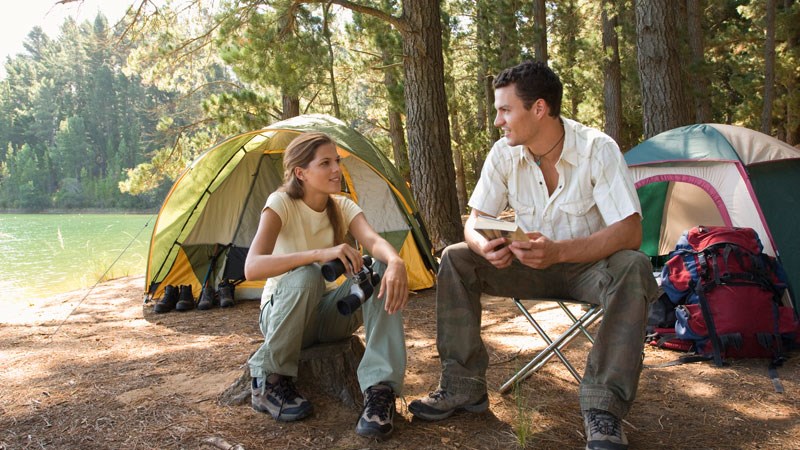Owner Don Zimmer is selling the six-acre campground in Pincher Creek, Alberta he has owned for 10 years, and is among those who caution dreamy-eyed investors that buying a running a campground is not as easy as some may think.
“It is not hard work,” Zimmer said, “but it is work.”
Zimmer’s Sleepy Hollow Campground & Mobile Home Park was listed at just over $1.1 million and “we have had a lot of tire kickers,” Zimmer said. Most interest was from aging baby boomers.
The campground, like most in Western Canada, is open from May to October and Zimmer said one of reasons he is selling is to get his summer vacations back.
Sleepy Hollow has the steady income from its mobile home sites, and Zimmer said recreational vehicles “with full hookups” are the most popular seasonal campsites.
Unlike some campgrounds, Sleepy Hollow has low potential of future development opportunities, due to a flood plain, a factor that should play into an investor’s decision, according to Calgary-based Soderquist Appraisals Ltd. Campground are not just a real estate play, emphasized Soderquist CA Mike Garcelon.
“You need a financial evaluation,” he said, so the investor should look closely at current and past income, the capitalization rate and the expense-to-income ratio.
Location is also a key factor, particularly if the potential exit strategy includes selling for equity appreciation, he added. “Is it close to a beach, a golf course, does it have paved road access; is it close to a city or at least main highway?”
An example is the Deep Bay RV Park, situated right on 7.5 acres of oceanfront 20 minutes north of Nanaimo on Vancouver Island. It is listed at $2.9 million and listing agent Jay Cousins said the price is based on the chance for redevelopment into 30 condominiums, not the camping income. Cousins, of Re/Max Nanaimo, estimated the returns on a typical campground, the capitalization rate, are in the 9 per cent to 10 per cent range.
Operating a campground can offer low-cost ongoing expenses, Garcelon said, especially if it is equipped with underground services, but they can be expensive to get into because of the financing required.
“Expect to need a hefty downpayment,” he said, with 30 per down usually considered a minimum.
Because they are few campground sales each year and each listing is unique, it is often difficult to assess the market value, Garcelon said, which puts a great emphasis on the buyer to do their due diligence. He said financing is available for viable properties, and vendors are sometimes willing to offer take back mortgages if lenders are reluctant to offer more than 70 per cent financing.
Some other tips on financing campgrounds, from finance industry contacts, include: Lenders may chose not to finance any park where the financials did not support the payments and provide a livable income to the owner; and the buyer should have the financial reserves to allow for any repairs and allow the owner to carry the property through the offseason.
An option today for investors is to consider selling lots as strata units, like a condo building, rather than renting them out on a daily or weekly basis, according to Rich Osborne of LandQuest Realty Ltd. of New Westminster. Osborne said the lack of campgrounds – more than half have disappeared in the south Okanagan alone in the past 15 years for example– has convinced many RV owners to buy their own camping spot.
For instance, LandQuest is offering full-hookup lakefront sites at Watch Lake in the north Cariboo from $88,500.
Okanagan realtor Tim Down said there is a good reason why there are so few listings of campgrounds today, especially prime sites. “The majority have been sold and redeveloped with condo projects over the last 10 years,” said Down, of Coldwell Bankers in Kelowna.
Think RVs
Those buying campgrounds must be aware that recreational vehicles, not tents, are now the camping option of choice. This means that the campground must be capable of offering or upgrading to sewage stations, 30 to 50 amp power outlets, water hookups, and often WI-FI services and even pools or clubhouses to attract visitors. Last year, noticing the big increase in such “power camping”, the Alberta government began a $23 million campaign to modernize provincial campgrounds to handle RVs.
Both Osborne and Zimmer say that RVs is where the campground industry is steering, and industry stats back them up. According to a survey by PF Consulting, done for Go Rving Canada, there are now more than one million RVs on the road in Canada, which translates to 14 per cent of households owning an RV,
So should you buy a campground? The answer is yes because of a lack of competition, an increase in RV usage and, if it is in the right location, an impressive potential upside in value, insiders say.
- Archived article from June 2013, Western Investor



